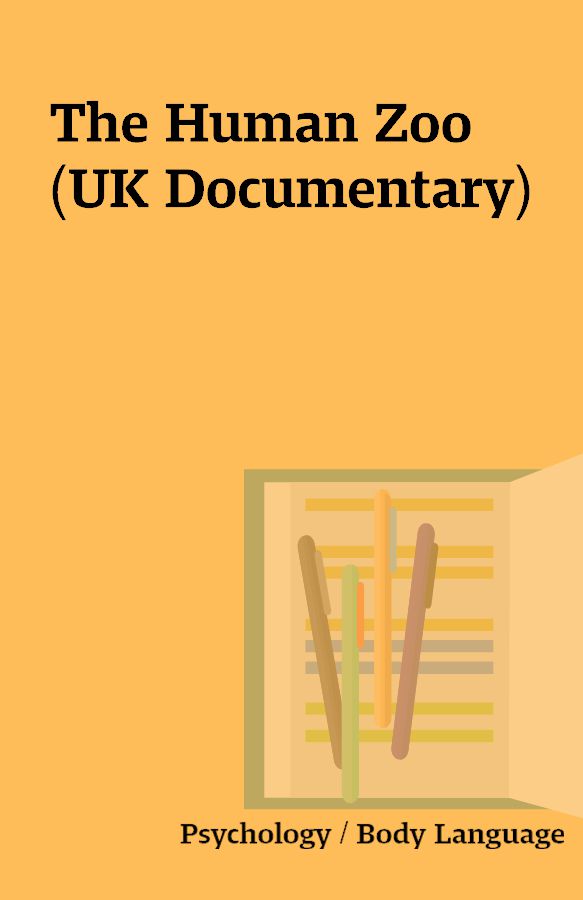The Human Zoo (UK Documentary)
The Human Zoo [3 avi’s (XViD)]
[3 avi’s (XViD)]
Description
This documentary is often humorous in its otherwise clinical approach to how people judge others, find ways to get along, or become managers and followers. Dr. Mark McDermott and Dr. Phil Zimbardo launched a three-day experiment called “The Human Zoo” and used hidden cameras to observe and explain how a group of strangers interacted during what the subjects know is a psychological experiment, although they do not know what the purpose of it is, nor that they are being surveyed almost constantly. Immediate friendships and hostilities are watched by the professors; these scenes are inter-cut with other researchers exploring similar psychological dynamics. Actor/comedian Charlie Skelton, among others, cooperates to test British citizens who do not know they are being filmed.(Thanks to TCO at TB for original upload)Episode 1 – Brief EncountersWe are all amateur psychologists, because most of what we do is designed to influence what others think of us. What do people look for when sizing up others during an initial meeting? How do these judgments influence their conduct? And how far will they go to hit it off? This program analyzes the subtle dynamics of meeting new people as Day One in the Human Zoo unfolds. In addition, other researchers explore the impact of first impressions at a job interview, how physical attractiveness affects success, the parameters of personal space, and facial expressions. Dr. Mark McDermott and Dr. Phil Zimbardo used hidden cameras to observe how a group of strangers will interact during the first day of what the subjects know is a psychological experiment. Immediate friendships and hostilities are watched by the professors; these scenes are inter-cut with other researchers exploring such dynamics as the impact of first impressions at a job interview and how physical attractiveness affects success. Actor/comedian Charlie Skelton, among others, intrudes on the personal space of British citizens who do not know they are being filmed, and three test subjects are required to undergo the temptation of robbery and then filmed while they deny their guilt to an inquisitor. The documentary returns in the end to The Human Zoo to dramatize how the group of strangers has bonded or formed private friendships in emotional and occasionally bizarre ways, as when one subject, Richard, who had felt himself to be an outsider all day, became a local hero to some of them when he stole beers from the facility’s refrigerator and passed them around to the others. Episode 2 – Following the HerdIn this program – day two at The Human Zoo – the group is divided into two separate but distinctly unequal teams in order to study the concept of herd mentality. In a struggle to reconcile their conflicting loyalties, the subjects make some hard choices as yesterday’s group bonding dissolves into adversarial team rivalry. Other researchers also examine clique mentality, bystander apathy, and diffusion of responsibility. As a counterpoint, the effects of positive herd behavior are illustrated by a Weight Watchers support group. Archival footage of Dr. Zimbardo’s controversial 1971 Stanford University “prison” experiment is also included. Episode 3 – Crimes of ObedienceHow far will people “go along to get along”? A reality-based experiment that tracks the behavior of 12 people isolated in a country house in Britain. Teams of psychologists conduct and comment on this and other experiments designed to test the limits of human behavior. Day three at the Human Zoo finds yesterday’s winning team in command of the losers, a difficult situation that sparks a bitter clash of wills that ends with the underdogs turning the tables on their oppressors. Using the Zoo crew as a case study, this program investigates the strange power of obedience. In addition, other researchers perform experiments that reveal how easily authority, when viewed as infallible, can lead people into errors of judgment and antisocial behavior. Footage of Stanley Milgram’s controversial obedience experiment at Yale University is provided as well.
You must be logged in to post a review.






Reviews
There are no reviews yet.